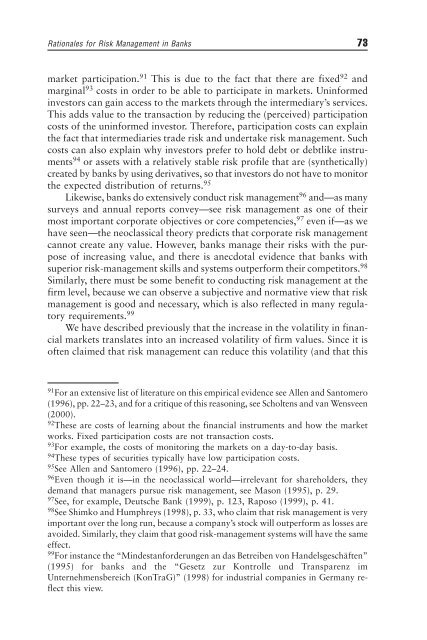Risk Management and Value Creation in ... - Arabictrader.com
Risk Management and Value Creation in ... - Arabictrader.com
Risk Management and Value Creation in ... - Arabictrader.com
Create successful ePaper yourself
Turn your PDF publications into a flip-book with our unique Google optimized e-Paper software.
Rationales for <strong>Risk</strong> <strong>Management</strong> <strong>in</strong> Banks 73<br />
market participation. 91 This is due to the fact that there are fixed 92 <strong>and</strong><br />
marg<strong>in</strong>al 93 costs <strong>in</strong> order to be able to participate <strong>in</strong> markets. Un<strong>in</strong>formed<br />
<strong>in</strong>vestors can ga<strong>in</strong> access to the markets through the <strong>in</strong>termediary’s services.<br />
This adds value to the transaction by reduc<strong>in</strong>g the (perceived) participation<br />
costs of the un<strong>in</strong>formed <strong>in</strong>vestor. Therefore, participation costs can expla<strong>in</strong><br />
the fact that <strong>in</strong>termediaries trade risk <strong>and</strong> undertake risk management. Such<br />
costs can also expla<strong>in</strong> why <strong>in</strong>vestors prefer to hold debt or debtlike <strong>in</strong>struments<br />
94 or assets with a relatively stable risk profile that are (synthetically)<br />
created by banks by us<strong>in</strong>g derivatives, so that <strong>in</strong>vestors do not have to monitor<br />
the expected distribution of returns. 95<br />
Likewise, banks do extensively conduct risk management 96 <strong>and</strong>—as many<br />
surveys <strong>and</strong> annual reports convey—see risk management as one of their<br />
most important corporate objectives or core <strong>com</strong>petencies, 97 even if—as we<br />
have seen—the neoclassical theory predicts that corporate risk management<br />
cannot create any value. However, banks manage their risks with the purpose<br />
of <strong>in</strong>creas<strong>in</strong>g value, <strong>and</strong> there is anecdotal evidence that banks with<br />
superior risk-management skills <strong>and</strong> systems outperform their <strong>com</strong>petitors. 98<br />
Similarly, there must be some benefit to conduct<strong>in</strong>g risk management at the<br />
firm level, because we can observe a subjective <strong>and</strong> normative view that risk<br />
management is good <strong>and</strong> necessary, which is also reflected <strong>in</strong> many regulatory<br />
requirements. 99<br />
We have described previously that the <strong>in</strong>crease <strong>in</strong> the volatility <strong>in</strong> f<strong>in</strong>ancial<br />
markets translates <strong>in</strong>to an <strong>in</strong>creased volatility of firm values. S<strong>in</strong>ce it is<br />
often claimed that risk management can reduce this volatility (<strong>and</strong> that this<br />
91 For an extensive list of literature on this empirical evidence see Allen <strong>and</strong> Santomero<br />
(1996), pp. 22–23, <strong>and</strong> for a critique of this reason<strong>in</strong>g, see Scholtens <strong>and</strong> van Wensveen<br />
(2000).<br />
92 These are costs of learn<strong>in</strong>g about the f<strong>in</strong>ancial <strong>in</strong>struments <strong>and</strong> how the market<br />
works. Fixed participation costs are not transaction costs.<br />
93 For example, the costs of monitor<strong>in</strong>g the markets on a day-to-day basis.<br />
94 These types of securities typically have low participation costs.<br />
95 See Allen <strong>and</strong> Santomero (1996), pp. 22–24.<br />
96 Even though it is—<strong>in</strong> the neoclassical world—irrelevant for shareholders, they<br />
dem<strong>and</strong> that managers pursue risk management, see Mason (1995), p. 29.<br />
97 See, for example, Deutsche Bank (1999), p. 123, Raposo (1999), p. 41.<br />
98 See Shimko <strong>and</strong> Humphreys (1998), p. 33, who claim that risk management is very<br />
important over the long run, because a <strong>com</strong>pany’s stock will outperform as losses are<br />
avoided. Similarly, they claim that good risk-management systems will have the same<br />
effect.<br />
99 For <strong>in</strong>stance the “M<strong>in</strong>destanforderungen an das Betreiben von H<strong>and</strong>elsgeschäften”<br />
(1995) for banks <strong>and</strong> the “Gesetz zur Kontrolle und Transparenz im<br />
Unternehmensbereich (KonTraG)” (1998) for <strong>in</strong>dustrial <strong>com</strong>panies <strong>in</strong> Germany reflect<br />
this view.










